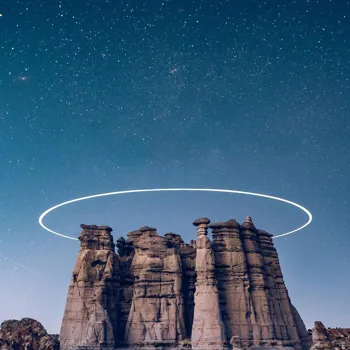Unveiling Astronomy's Impact on Indian Culture: Explore how stars shape beliefs, calendars, and architecture in India. Read more!
For centuries, the twinkling stars and the vast expanse of the cosmos have
captured the imagination of humankind. But astronomy, the scientific study of celestial objects, is much more than just gazing at the night sky.
It has profoundly shaped our cultures, beliefs, and way of life, particularly in India, where the connection between the heavens and the earth runs deep. From ancient rituals to architectural marvels, astronomy's influence is woven into the very fabric of Indian society.
Ancient Indian astronomy: rich history, Vedas foundational
The history of astronomy in India is rich and ancient, dating back to the Indus Valley Civilization. Archaeological findings suggest that these early inhabitants possessed a sophisticated understanding of the movements of the Sun, Moon, and stars.
They used this knowledge for practical purposes such as agriculture, navigation, and timekeeping. The Vedas, ancient Hindu scriptures, contain detailed astronomical observations and calculations, demonstrating a deep understanding of celestial phenomena.
These texts laid the foundation for later astronomical developments in India.
Indian calendars based on astronomy shape cultural events
One of the most significant ways astronomy has influenced Indian culture is through the development of calendars and timekeeping systems. The traditional Indian calendars, such as the Panchang, are based on the positions of the Sun, Moon, and planets.
These calendars are used to determine auspicious dates for festivals, ceremonies, and other important events. The concept of time itself, with its divisions into days, months, and years, is deeply rooted in astronomical observations.
Ancient Indian text explores astronomy's role in daily life
The Surya Siddhanta, a prominent text from ancient India, delves into astronomical calculations, laying the groundwork for advanced mathematical systems. These systems were instrumental in determining precise timings for religious ceremonies, agricultural activities, and other aspects of daily life.
This intricate knowledge of the stars and their alignment further solidified the significance of astronomy in India's cultural tapestry.
Indian mythology intertwines astronomy with deities and destiny
Astronomy plays a crucial role in Indian mythology and religion. Many deities are associated with celestial bodies. For example, the Sun is revered as Surya, the god of light and energy, while the Moon is associated with Chandra, the god of emotions and tranquility.
The planets, known as Grahas, are believed to influence human destiny, and their positions are carefully considered in astrology. Stories about constellations and celestial events are passed down through generations, shaping our understanding of the universe and our place within it.
Ancient Indian astronomers advanced math and astronomy globally
Ancient Indian astronomers and mathematicians made remarkable contributions to the field, calculating the circumference of the Earth and the distance to the Moon with a level of accuracy that was unmatched.

These pioneering works formed the base of Indian mathematical astronomy, which had a profound influence on later astronomical developments in other parts of the world.
Indian architecture influenced by astronomy, seen in temples and Jantar Mantar observatories
The influence of astronomy extends to Indian architecture as well. Many ancient temples and monuments are aligned with celestial events, such as the solstices and equinoxes.

The Jantar Mantar observatories, built by Maharaja Jai Singh II in the 18th century, are prime examples of astronomical architecture. These structures were designed to make precise astronomical observations, demonstrating a keen interest in understanding the cosmos.
Indian temples integrate astronomy into culture and spirituality
The alignments of temples and other structures with celestial events highlight the deep integration of astronomy into the religious and cultural practices of India. These structures served as both places of worship and observatories, connecting the earthly realm with the celestial one.

This unique blend of spirituality and scientific observation is a testament to the profound influence of astronomy on Indian culture.
Modern Indian astronomy thrives with ISRO's groundbreaking research
Despite its ancient roots, astronomy continues to thrive in modern India. Research institutions like the Indian Space Research Organisation (ISRO) are conducting groundbreaking astronomical research, exploring the mysteries of the universe with cutting-edge technology.

Indian astronomers are actively involved in international collaborations, contributing to our understanding of black holes, galaxies, and the origins of the universe.
Astronomy studies in institutions promote scientific temper, preserve India's legacy
The study of astronomy, particularly in institutions, enables the younger generation to explore the possibilities and unravel the universal facts and truths. This contributes to the development of scientific temper and fosters a knowledge-based society.

This continued active engagement ensures that India's legacy in astronomy remains vibrant and relevant in the 21st century.
Astronomy in India: cultural heritage connecting past and future
Astronomy in India is more than just a scientific discipline; it is a cultural heritage that connects us to our past and inspires us to explore the unknown.
By understanding the role of astronomy in shaping our cultural history, we gain a deeper appreciation for the contributions of our ancestors and the universality of our quest to understand the cosmos.
Astronomy serves as a bridge between science and culture, enriching our lives and expanding our understanding of the world around us and above us.
Exploring cosmic mysteries, inspiring future scientists
It encourages us to ask fundamental questions about our place in the universe, pushing the boundaries of our knowledge and inspiring future generations of scientists and dreamers.

The night sky, with its myriad of stars, remains a reminder of the infinite possibilities that lie beyond our world, waiting to be discovered.
As India continues to explore the cosmos, it carries with it a rich legacy of astronomical knowledge and a deep cultural connection to the stars, ensuring that the light of astronomy continues to shine brightly for generations to come.
AI Generated Content. Glance/InMobi shall have no liability for the content
















